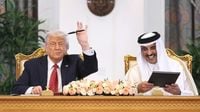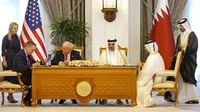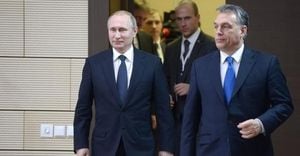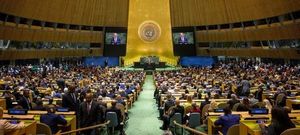In a stunning and highly unorthodox move, U.S. President Donald Trump has signed an executive order vowing to defend the energy-rich nation of Qatar with all available means—including, if necessary, U.S. military action. The order, dated Monday, October 1, 2025, and made public on the White House website on Wednesday, has sent shockwaves through diplomatic circles and ignited a heated debate in Washington and beyond about the future of American foreign policy in the Middle East.
The executive order pledges that the United States will regard "any armed attack on the territory, sovereignty, or critical infrastructure of the state of Qatar as a threat to the peace and security of the United States." In such an event, the order states, the U.S. will take "all lawful and appropriate measures—including diplomatic, economic, and, if necessary, military—to defend the interests of the United States and of the state of Qatar and to restore peace and stability." According to Foreign Policy, this unprecedented step effectively offers Qatar security guarantees reminiscent of NATO's Article 5, which treats an attack on one as an attack on all.
Why now? The timing of the order is no coincidence. Just weeks before, Israel launched a surprise attack on Doha, targeting senior Hamas leaders as they were reportedly weighing a ceasefire with Israel over the war in Gaza. The Israeli strike, which failed to kill any top Hamas figures but did result in the deaths of five Hamas members and a Qatari security officer, enraged Doha. Israeli Prime Minister Benjamin Netanyahu, under pressure from Trump, called Qatar from the White House to "express his deep regret" over the incident. The White House confirmed that Trump himself later spoke by phone with Qatar's ruling emir, Sheikh Tamim bin Hamad Al Thani, to discuss Doha's ongoing efforts to secure a ceasefire in the Israel-Hamas conflict.
Qatar's Foreign Ministry quickly described the U.S. pledge as "an important step in strengthening the two countries' close defense partnership." The Qatari-funded Al Jazeera network declared: "New Trump executive order guarantees Qatar security after Israeli attack." The move, however, has left many in Washington and beyond scratching their heads. As Foreign Policy points out, it's highly unusual—if not outright unprecedented—for a U.S. president to unilaterally offer such sweeping security guarantees to another nation without congressional approval. Under the Constitution, only Congress can declare war, and treaties require Senate ratification. An executive order, while powerful, carries far less legal weight and could be easily undone by a future president.
Still, presidents do have broad authority over the military under Article II of the Constitution, and Trump has shown a willingness to use force without congressional approval in the past. The move marks a sharp departure from his oft-repeated "America First" foreign policy and his campaign pledges to avoid "new wars" during his second term. As Foreign Policy notes, "any involvement of troops in response to such an incident would also undermine the president’s pledge for 'no new wars' during his second term." It also comes at a time when Trump is facing mounting criticism for his complex web of business dealings in the Gulf region.
Indeed, Qatar and Trump have grown increasingly close in recent years. The United States has long considered Qatar a major non-NATO ally, a designation formalized by President Joe Biden in 2022 in recognition of Qatar's help during the U.S. withdrawal from Afghanistan. The largest U.S. military base in the Middle East, Al Udeid Air Base, sits just 20 miles southwest of Doha and houses the U.S. Central Command's forward operating base. That base has not been immune to regional tensions: in June, it was targeted by Iran following U.S. strikes on Iranian nuclear facilities.
Qatar, a tiny peninsular nation jutting into the Persian Gulf, is fabulously wealthy thanks to its vast natural gas reserves. Its government has long viewed the U.S. military presence as a bulwark against regional volatility, while also seeking to play the role of mediator in conflicts such as the ongoing war in Gaza. The recent Iranian and Israeli attacks, however, have shaken Doha's sense of security, making Trump's new guarantees all the more significant from the Qatari perspective.
The relationship between Trump and Qatar is not purely strategic. Earlier this year, Qatar gifted Trump a $400 million 747 jetliner, slated to become the new Air Force One. In April, the Trump Organization inked a deal to build a multibillion-dollar luxury golf resort in Qatar—a project that has already drawn scrutiny from ethics watchdogs. As Foreign Policy notes, "the new executive order is likely to place Trump’s dealings with Qatar (and Gulf countries more generally) under an even more uncomfortable spotlight—while also raising questions about his purported commitment to keeping the United States out of foreign entanglements."
Not everyone is pleased with the new arrangement. Laura Loomer, a prominent right-wing commentator and fixture of Trump's second term, took to X (formerly Twitter) to declare, "I don't want to die for Qatar. Do you?" The Wall Street Journal's editorial board also voiced concern, writing, "This is a decision that can be and should have been debated. Instead it comes out of the blue—an executive order following no public debate." These criticisms underscore a broader unease about the lack of congressional involvement and the potential for the U.S. to be drawn into yet another Middle Eastern conflict.
Regional dynamics are shifting rapidly in the wake of the Israeli strike on Qatar. Saudi Arabia, for example, recently entered a mutual defense agreement with Pakistan, bringing the kingdom under Islamabad's nuclear umbrella. Other Gulf Arab states, wary of both Israeli and Iranian ambitions (especially as Iran faces renewed United Nations sanctions over its nuclear program), may soon seek similar arrangements with Washington or other powers. As Bader al-Saif, a history professor at Kuwait University, observed in Foreign Policy: "The Gulf's centrality in the Middle East and its significance to the United States warrants specific U.S. guarantees beyond President Donald J. Trump's assurances of nonrepetition and dinner meetings."
For now, the true scope of Trump's pledge remains uncertain. While the executive order is a bold signal of solidarity with Doha, it is not a legally binding treaty and could be reversed by a future president. As history has shown, presidents can and do make international commitments without Senate approval—President Barack Obama's 2015 nuclear deal with Iran being a notable example—but the ultimate power to send American troops into harm's way rests with the occupant of the Oval Office.
As the situation develops, all eyes will be on how America's evolving relationship with Qatar—and the broader Gulf region—shapes the next chapter of Middle Eastern security. With tensions running high and alliances shifting, the world is left to wonder just how far Washington will go to defend its friends in the Gulf, and at what cost.





